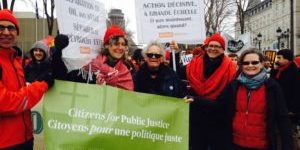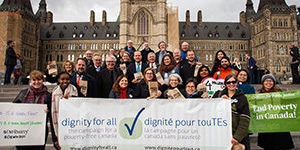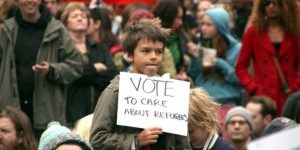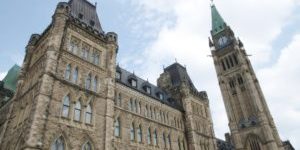Upholding Refugee Rights
CPJ envisions a world in which individuals, societal institutions and governments all contribute to and benefit from the common good. We strive to bring about public justice and promote human rights.
This framework is particularly imperative when working on issues that surround the treatment of refugees. All refugees are immigrants, but not all immigrants are refugees. As some of the world’s most vulnerable people, refugees require compassion and support, rather than the condemnation, xenophobia, and racism that have surfaced more openly in Canada as of late.
Over the years, Canada has maintained a relatively generous immigration policy and a reasonable refugee policy. Our refugee determination system is considered the global gold standard, which is why, in 1986, the people of Canada were awarded the Nansen Medal by the United Nations in recognition of their contribution to refugee resettlement. Canada currently accepts about 300,000 new immigrants annually, making us a multicultural hub. Refugees and Protected Persons only make up a small fraction of this total, however, with government target projections welcoming between 45,000 and 50,000 of these newcomers yearly, across all sponsorship streams, over the next three years.
In April 2019, Canada celebrated the 40th anniversary of the Private Sponsorship of Refugees Program, through which it has resettled a total of 327,000 refugees. In 1985, the Supreme Court of Canada declared that the legal guarantees of the Charter of Rights and Freedoms applied to "everyone" physically present in Canada, including foreign asylum seekers. On April 4, Canadians mark Refugee Rights Day, celebrated annually for this landmark declaration.
Why Canada needs immigrants
Canada needs immigrants to meet its labour force needs. The Conference Board of Canada reports that Canada’s fertility rate stands at 1.6, well below the population replacement rate of 2.1. Immigrants currently make up 65% of Canada’s net annual population growth. This implies that if immigration was stopped now, deaths would exceed births by the year 2034. By 2035, 5 million Canadians will reach retirement age, at which time it is estimated that 350,000 immigrants will be needed annually by 2035 in order to meet Canada’s workforce demands.

The Syrian crisis and travel loan repayments
When the Syrian crisis was brought to the world’s attention by the drowning of three-year-old Alan Kurdi, whose family has connections to Canada, Canada pledged to give sanctuary to 25,000 Syrians within one year. Canadians welcomed refugees at our airports with open arms, and the government promoted Syrian resettlement as a victory for Canadians and refugees alike.
The government gave these specific Syrian refugees a soft landing by exempting them from the financial stresses associated with repaying travel loans. A debt that can cost up to $10,000 upon arrival for other refugees. This was seen as a double standard, and critics, including CPJ, called on the government to extend similar consideration to all refugees resettled in Canada. 98% of the Immigration Loans Program users are refugees whose ability to settle in Canada is burdened by the requirement to repay these loans. As such, the government must eliminate repayment of travel loans for refugees and absorb the costs as part of the resettlement process.
Learn More: For further information on our advocacy, and to read real stories about the impact this debt has on refugees, check out our #WaiveRepayment campaign
The Safe Third Country Agreement (STCA)
In 2004, Canada signed an agreement known as the Safe Third Country Agreement (STCA) with the United States. It allows the Canada Border Services Agency to return refugee claimants who arrive at an official land border to the U.S. because the agreement stipulates that refugees should make their claim in the first "safe" country in which they arrive. By the end of 2018, 40,000 irregular border crossings occurred in Canada.
People do not become refugees by choice, rather, they are forced to flee for safety. Due to recent executive orders in the U.S. that have increased restrictions on immigration and altered criteria for refugee determination, the U.S. is no longer a safe country for many refugee claimants.
When politicians describe refugee claimants as “illegals,” “queue jumpers” or “asylum shoppers,” it creates discriminatory public discourse and provides ammunition for the dangerous and misinformed anti-refugee rhetoric that exists in Canada. It also confers a false element of criminality on those seeking refugee protection. In our June 2018 report, Reclaiming Protection, CPJ called for the STCA to be rescinded to restore the integrity of Canada’s obligations. The Canadian Council for Refugees, Amnesty International and the Canadian Council of Churches remain in Federal Court challenging the designation of the U.S. as a safe third country for refugees.
Learn More: Read CPJ’s Reclaiming Protection report, which details how the STCA has restricted access to refugee protection, put refugees in danger, and failed to uphold their rights to receive a fair hearing in Canada.
Amendments to the Immigration and Refugee Protection Act (IRPA) in Bill C-97
In April 2019, just a week after celebrating Refugee Rights Day, the federal government stealthily scuttled the rights of refugees by burying drastic changes to IRPA in the omnibus budget bill. It was disheartening that less than a week after celebrating these momentous achievements, the government backpedalled from its commitment to uphold the rights of refugees.
Concealed in Bill C-97 is a new ground of ineligibility for refugee claimants who have previously made a claim in the U.S., U.K., Australia or New Zealand, deeming them ineligible to claim refugee status in Canada. Given the current political contention over irregular arrivals, it is clear that this provision is aimed at those whose refugee claims have been rejected in the United States and thus, wish to seek safety in Canada. CPJ issued a statement condemning this assault on refugee rights.
Busting Myths About Refugees in Canada
A lot of misinformation surrounds refugees in Canada. It can be hard to discern fact from fiction. Check out our list of common misconceptions to stay informed and continue to stand up for the rights of refugees.

Racism & anti-immigrant rhetoric
There has been a sharp increase in anti-immigrant rhetoric openly across Canada. An EKOS poll shows that there has been a distinct increase in opposition to visible-minority immigration. That worrying trend must be called out for what it is – racial discrimination.
Racism is an important factor that dictates views about immigration. Most of the border-crossers from the United States originate from Haiti and Nigeria, which are majority Black countries. Many were forced to flee terrorism or war in their home countries, and are now fleeing racist policies that have made the U.S. an unsafe place for them to live.
Support for anti-immigrant and white supremacist ideologies perpetuate hate-filled and uninformed dialogue about refugees, while also amplifying ignorance of the lived experiences of this vulnerable population. All refugees must be treated equally and equitably, no matter where they come from.
It’s time for the electorate to hold leaders to account when their politics could jeopardize the safety of some of the world’s most vulnerable. All of us must bear in mind that refugee rights are human rights and that Canada has a duty to uphold its moral, charter, and international obligations.
“As long as there are wars and persecution, there will be refugees... Their story is one of resilience, perseverance and courage. Ours must be of solidarity, compassion and action.”
– UN Secretary General, António Guterres
ASK FEDERAL CANDIDATES:
- Would your government absorb the cost of travel for all refugees and waive repayment for those currently in debt to ensure equal and equitable treatment for all resettled refugees?
- Will you commit to ensuring Canada removes restrictions placed on refugee claims originally made in other “safe” countries? And that Canada rescinds the STCA with the United States to ensure refugee claimants are protected and that their rights are being upheld?
- How do you plan to ensure that the multiple and specific barriers faced by the most vulnerable refugees are understood and mitigated through policy? In what tangible ways will you address racism as it pertains to immigration and white supremacist ideology among Canadians? Would you support the development and implementation of an anti-racism strategy for refugee resettlement and claimant processes?
- What role do you believe the Canadian government should play in resettling refugees from around the world? Do you believe we’re doing enough?







